
Liquefied natural gas (LNG) is natural gas (predominantly methane, CH4, with some mixture of ethane, C2H6) that has been cooled down to liquid form for ease and safety of non-pressurized storage or transport. It takes up about 1/600th the volume of natural gas in the gaseous state (at standard conditions for temperature and pressure).

Bulk cargo is commodity cargo that is transported unpackaged in large quantities.
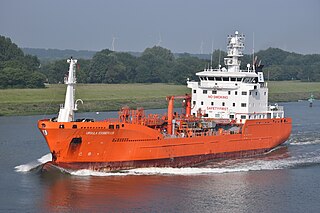
A chemical tanker is a type of tanker ship designed to transport chemicals in bulk. As defined in MARPOL Annex II, chemical tanker means a ship constructed or adapted for carrying in bulk any liquid product listed in chapter 17 of the International Bulk Chemical Code. As well as industrial chemicals and clean petroleum products, such ships also often carry other types of sensitive cargo which require a high standard of tank cleaning, such as palm oil, vegetable oils, tallow, caustic soda, and methanol.

A tanker is a ship designed to transport or store liquids or gases in bulk. Major types of tankship include the oil tanker, the chemical tanker, and gas carrier. Tankers also carry commodities such as vegetable oils, molasses and wine. In the United States Navy and Military Sealift Command, a tanker used to refuel other ships is called an oiler but many other navies use the terms tanker and replenishment tanker. Tankers were first developed in the late 19th century as iron and steel hulls and pumping systems were developed. As of 2005, there were just over 4,000 tankers and supertankers 10,000 LT DWT or greater operating worldwide.
Jo Tankers, based in Norway, was one of the world's main providers of deep-sea transportation services for chemicals and other high value liquids.

An oil terminal is an industrial facility for the storage of oil, petroleum and petrochemical products, and from which these products are transported to end users or other storage facilities. An oil terminal typically has a variety of above or below ground tankage; facilities for inter-tank transfer; pumping facilities; loading gantries for filling road tankers or barges; ship loading/unloading equipment at marine terminals; and pipeline connections.
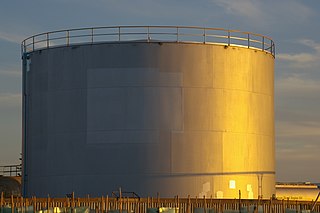
Storage tanks are containers that hold liquids, compressed gases or mediums used for the short- or long-term storage of heat or cold. The term can be used for reservoirs, and for manufactured containers. The usage of the word tank for reservoirs is uncommon in American English but is moderately common in British English. In other countries, the term tends to refer only to artificial containers.
Odfjell SE is a company specialising in worldwide seaborne transportation and storage of chemicals and other speciality bulk liquids. The Odfjell fleet comprises more than 80 ships in total. The ships transport around 600 different kinds of liquids, including organic and inorganic bulk liquid chemicals, acids, animal fats, edible oils, portable alcohols and clean petroleum products. Odfjell’s ships are mainly registered in Norway (NIS) and Singapore, and are primarily manned by Norwegian and Filipino mariners.
Niels G. Stolt-Nielsen is a Norwegian business leader. Since 1996 he has served as director of Stolt-Nielsen Limited (SNL), a company with principal operations in parcel tankers, bulk-liquid storage, tank containers and aquaculture. Since 2000 he has been the company's chief executive officer, taking over after his father, Jacob Stolt-Nielsen.

Golar LNG owns and operates marine LNG infrastructure. The company had developed Floating LNG liquefaction terminal (FLNG) and Floating Storage and Regasification Unit (FSRU) projects based on the conversion of existing LNG carriers. Front End Engineering and Design (FEED) studies have now been completed for a larger newbuild FLNG solution. Golar is also collaborating with another industry leader to investigate solutions for the floating production of blue and green ammonia as well as carbon reduction in LNG production.
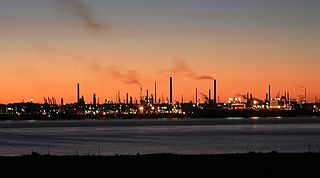
Fawley Refinery is an oil refinery located at Fawley, Hampshire, England. The refinery is owned by Esso Petroleum Company Limited, a subsidiary of Exxon Mobil Corporation, which acquired the site in 1925. Situated on Southampton Water, it was rebuilt and extended in 1951 and is now the largest oil refinery in the United Kingdom, and one of the most complex refineries in Europe. With a capacity of 270,000 barrels (43,000 m3) per day, Fawley provides 20 percent of the UK's refinery capacity. An estimated 1000 people are employed at the site.
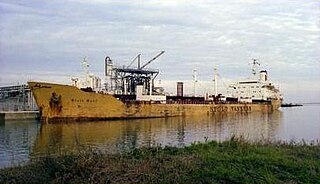
MS Stolt Surf was a chemical tanker, operated by Stolt-Nielsen Inc. She achieved a measure of infamy when she was struck and damaged by a rogue wave, an event that was photographed by a crew member and subsequently added to the ongoing debate over the possibility of such waves out in the deep ocean.
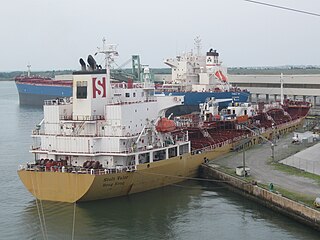
The MT Stolt Valor is a Hong Kong-flagged ship that was hijacked while in the Designated Safety Corridor within the Gulf of Aden, approximately 38 nautical miles (70 km) away from the coast of Yemen, while heading from the United States south through the Gulf towards Asia. After the ship passed through the Suez Canal, it encountered hijackers and alerted the International Maritime Bureau. Area coalition forces arrived too late to avert the hijacking which occurred at 10:16 UTC on September 15, 2008 by Somali pirates.
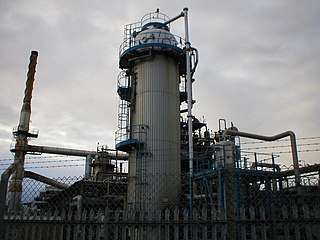
Eastham Oil Terminal is situated close to the small town of Eastham on the Wirral Peninsula, beside the Manchester Ship Canal. It was commissioned in 1954 close to the Queen Elizabeth II Dock and is a storage and export facility for oil products refined at Stanlow Refinery, to which it is connected by pipeline. The site is currently operated by Nynas.
Jacob Stolt-Nielsen Jr. was a Norwegian entrepreneur. The founder of Stolt-Nielsen Limited, he is widely credited as the creator of the parcel tanker concept. He also pioneered and built successful businesses in tank containers, offshore oilfield services and aquaculture. He served as a director on the board of Stolt-Nielsen Limited, where his son, Niels Gregers Stolt-Nielsen, is chief executive officer.

A gas carrier, gas tanker, LPG carrier, or LPG tanker is a ship designed to transport LPG, LNG, CNG, or liquefied chemical gases in bulk.
SS Golar Patricia was an oil tanker built by Kawasaki Heavy Industries of Sakaide in Japan for Gotaas-Larsen Shipping Company and launched in 1969. Gotaas-Larsen is a Norwegian company but it registered Golar Patricia in Monrovia to use the Liberian flag of convenience.

The HNS Convention is an international convention created in 1996 to compensate for damages caused by spillage of hazardous and noxious substances during maritime transportation. The convention is officially known as the International Convention on Liability and Compensation for Damage in Connection with the Carriage of Hazardous and Noxious Substances by Sea, 1996. The convention has not entered into force due to signatory states not meeting the ratification requirements. Canada, France, Germany, Greece, the Netherlands, Norway, and Turkey signed the 2010 protocol to the convention.














